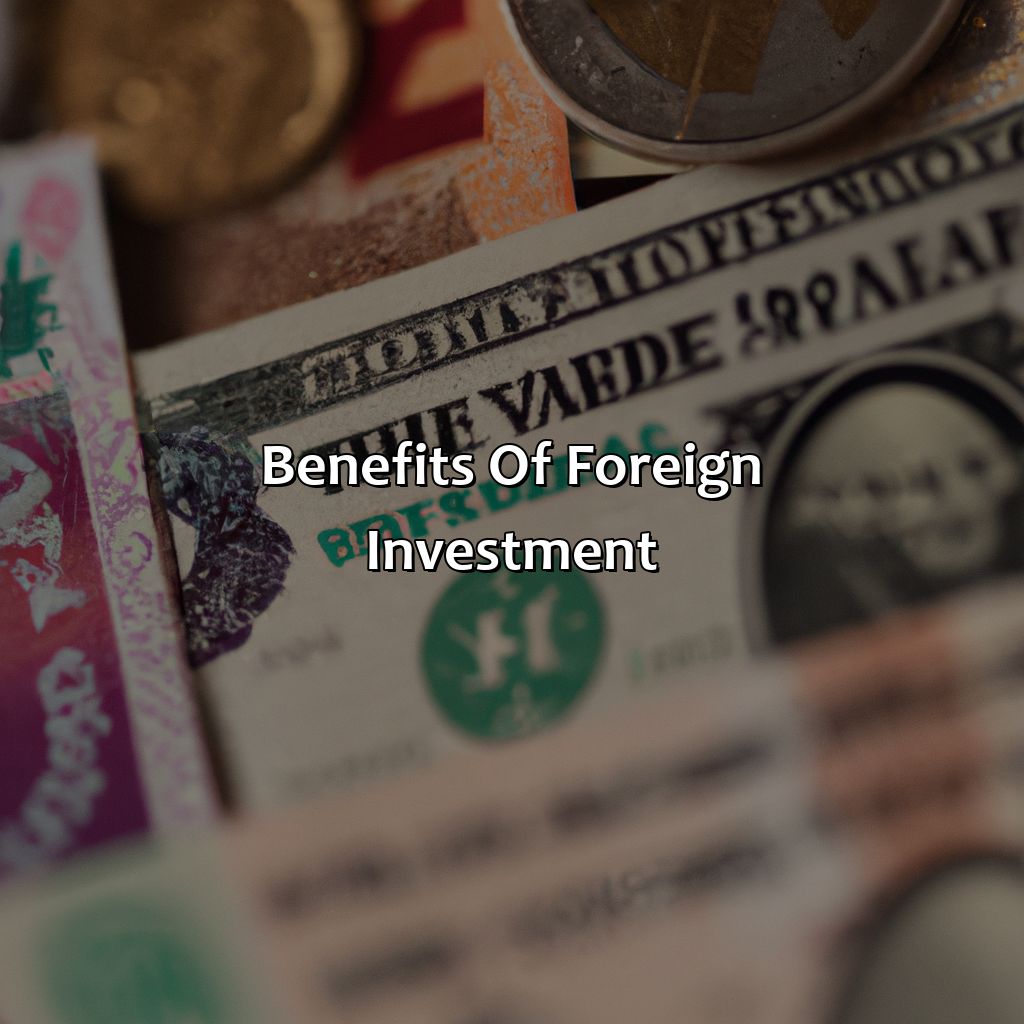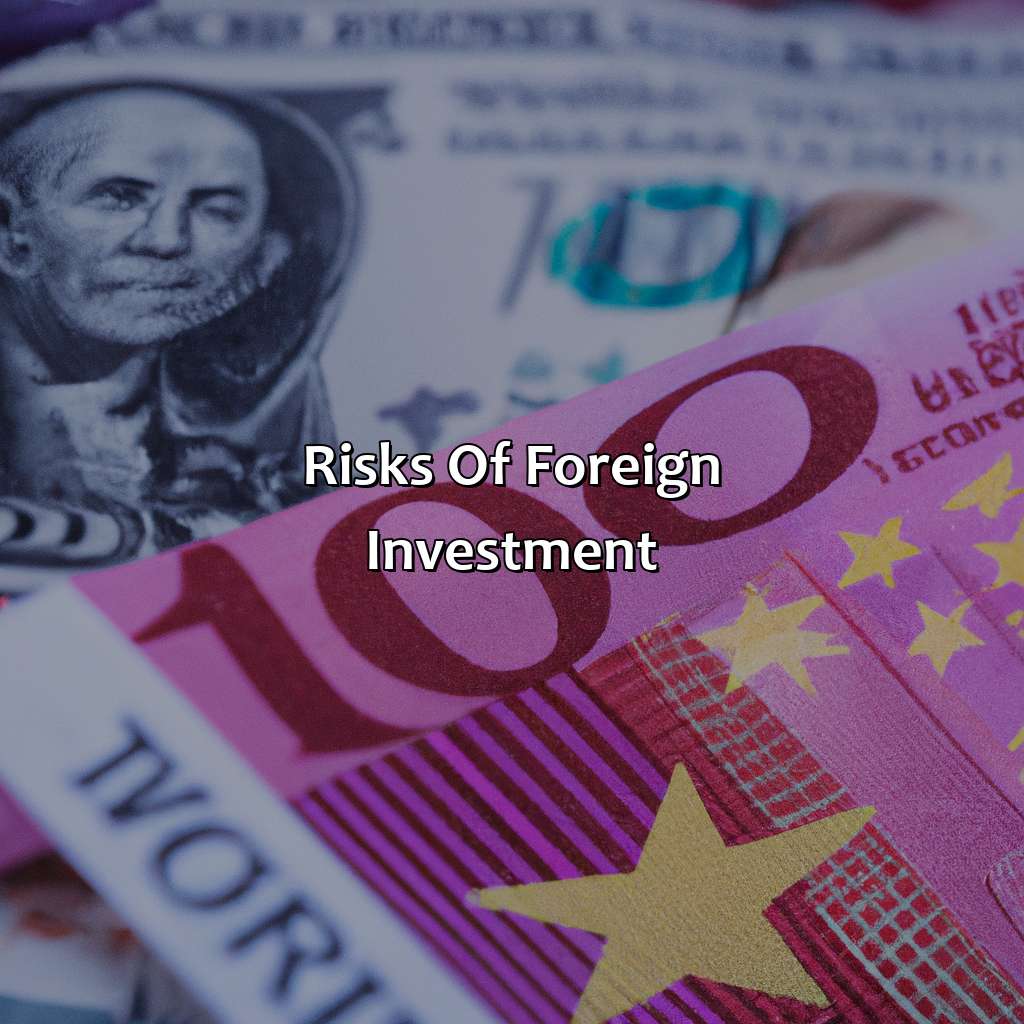What Is Foreign Investment?
Key Takeaway:
- Foreign Investment refers to the investment made by a foreign company or individual in the economy of another country. It involves purchasing assets or creating new ventures in the host country.
- There are two forms of foreign investment: Direct Investment and Portfolio Investment. Direct investment is when a foreign company sets up a subsidiary or acquires a controlling interest in an existing company in the host country. Portfolio investment is when a foreign investor purchases stocks, bonds, or other financial assets in the host country without acquiring a controlling interest.
- The benefits of foreign investment include economic growth, job creation, and technological advancement. It can bring in new technologies, skills, and management practices that can improve productivity and competitiveness. It can also create jobs and boost the host country’s export capacity.
- However, there are also risks associated with foreign investment, such as political instability, economic vulnerability, and regulatory changes. These risks can affect the return on investment and the viability of the project.
- Some examples of foreign investment include the investment made by Apple in China, ExxonMobil in Nigeria, and Toyota in the United States.
Are you feeling overwhelmed trying to make sense of foreign investment? This article will help you understand the concept and its implications on the economy. We will explore the pros and cons of foreign investment so you can make informed decisions.
Definition of Foreign Investment
As per foreign investment, it refers to when an entity or individual invests in another country’s assets or businesses, owning a part or whole of the endeavor. This investment is classified as either direct or indirect, with the former indicating an actual physical investment in the destination country, while the latter involves a portfolio investment.
Foreign investment can be beneficial to countries’ economies as it can bring in badly needed capital and employment opportunities. Such investments can be made through mergers and acquisitions, establishing new businesses, or participative joint ventures.
Notably, foreign investment has some potential risks, which include currency fluctuations, geopolitical risks, and regulatory changes from either country. Therefore, investors need to conduct due diligence before investing, such as analyzing economic and political conditions in the investment destination country. This helps alleviate risk while enabling sustained gains.
To ensure investing in a secure and profitable environment, individuals and entities need to work with qualified advisors, such as lawyers, accountants, or investment professionals, to navigate requirements and risks. Get started today and reap the benefits of a healthy diverse investment portfolio.

Image credits: retiregenz.com by Adam Woodhock
Forms of Foreign Investment
To discover the numerous varieties of foreign investment, you must go into the various types. So, let us delve into the two subsections: Direct Investment and Portfolio Investment.

Image credits: retiregenz.com by Joel Woodhock
Direct Investment
One of the ways foreign investors pool their resources into a host economy is by making a substantial acquisition or establishing a significant ownership stake in an enterprise. This arrangement is called ‘Foreign Direct Investment.’ FDI opens doors to long term involvement and hands-on management in overseas markets, with the potential for high returns. To achieve this, investors need to be mindful of local regulations, corporate governance structures, and risk assessment practices.
It is not always possible for foreign investors to participate in large scale projects through direct control via Foreign Direct Investment. An alternative approach that they can take is by investing limited funds with minimum engagement in joint ventures or limited partnerships called ‘Indirect Investment.’ Although this type requires minimal input from the foreign investor compared to FDI, it also limits the input they have in controlling the business.
Suppose an investor is keen on participating in companies’ market share or authority without being actively involved through partnership programs, then public capital markets can be their go-to solution- ‘Portfolio Investment.’ Unlike other investment types, portfolio investment allows investors to conveniently buy shares of services or products offered by corporations who are publicly listed without actively engaging as shareholders.
Despite FDI guarantees of high returns and potential market expansion opportunities for foreign investors, it comes with its risk factors such as political instability and drastic changes in currency value. Therefore, if an investor were considering taking advantage of these opportunities, it would be wise to adequately understand all the local regulations and engage seasoned professionals throughout each step of the process.
You can invest in stocks from all around the world without ever leaving your couch…or your pajamas.
Portfolio Investment
Foreign Portfolio Investment is the acquisition of foreign assets in the form of stocks, bonds or other financial instruments. This type of investment aims to build up a diversified portfolio of assets while achieving higher returns and reducing risks associated with owning a single stock. Foreign investors may invest directly in a target country’s domestic stock exchange or indirectly through reciprocal funds, exchange-traded funds or American Depositary Receipts.
FDI (Foreign Direct Investment) and FPI(Foreign Portfolio Investment) have different motivations for investing and are subject to different rules and regulations. While FDI focuses on long-term, equity-based investments in domestic industries, FPI deals with short-term investments that provides liquidity without controlling ownership. In contrast to FDI, which requires significant capital outlays, FPI typically involves smaller amounts of money.
The United States tops the chart as the largest recipient of foreign portfolio investment worldwide with a total net inflow of $2.2 trillion as per Statista report in 2019.
Foreign investment: because sometimes it’s better to let someone else take the financial risks while you sit back and reap the rewards.
Benefits of Foreign Investment
Highlighting the advantages of foreign investment is key for any nation’s growth. The following points will be discussed: Economic Growth, Job Creation, and Technological Advancement. These benefits are why foreign investment is essential for development, enabling advances in many industries.

Image credits: retiregenz.com by James Arnold
Economic Growth
Foreign investment can lead to an increase in economic prosperity. This can be attributed to the heightened competition, increased production capacity, and access to new technologies. These factors can improve productivity levels and employment opportunities, leading to a boost in economic growth.
Additionally, foreign investment can help local businesses by providing them with funds and expertise, helping them expand their operations. This expansion leads to increased commercial activity and improved infrastructure development within the country.
Moreover, with Foreign Direct Investment (FDI), foreign companies establish themselves locally which creates job opportunities for local communities, further improving the economy.
A recent study by the World Bank found that FDI flows increased globally in 2020 after two years of decline despite the pandemic’s effects.
Foreign investment: creating jobs for foreigners, one hire at a time.
Job Creation
Investments from foreign entities bring several advantages, including the creation of novel employment opportunities.
Establishing businesses in a foreign land aids local companies and sets off a chain reaction of job generation. This investment also elevates consumer spending, which stimulates economic growth and furthers employment opportunities.
The arrival of foreign investment paves the way for new facilities and infrastructures that are not only beneficial to global companies but to locals as well by providing them with employment, higher wages, and greater opportunities for business innovation. As foreign investments climb, so does the demand for raw materials and resources such as transportation systems, communication networks, and power grids that necessitate increased workforce.
Foreign investments generate well-paid jobs as multinational corporations can afford to offer better salaries due to their wider profit margins resulting in lucrative career prospects for many employees looking to take advantage of these opportunities. With high-skilled jobs available in various industries such as technology or manufacturing sectors spanning infrastructure development, tourism, mining sector etc., local employees benefit via higher income earnings.
In 2020 alone, foreign direct investment contributed to over 500000 job opportunities in the United States through investments exceeding $300 billion from Asia alone (source: Foreign Investment Review Board). The widespread adoption of this trend in developed nations is positively impacting global economic growth while creating new prosperity sources within these countries.
Thanks to foreign investment, we can now all enjoy the wonders of technology, including advanced robots that will one day take over our jobs.
Technological Advancement
Investing in Foreign Technology: The Benefits
Absolutely! Who doesn’t want to leverage the latest technological advancements? Foreign investment helps to achieve this goal. The influx of capital and additional resources enables companies to upgrade their technologies, systems and processes, which increases efficiency, productivity and customer satisfaction.
With enhanced technology, businesses can develop more innovative ideas and products. High-quality technology also reduces operational costs by automating repetitive tasks. Additionally, improved technology can lead to the adoption of better production techniques resulting in higher-quality products. Such advantages result in increased competitiveness across industries.
Foreign investment facilitates the creation of employment opportunities for locals whilst increasing a country’s GDP and foreign exchange reserves, among other benefits.
Join the ranks of successful companies that have taken action on foreign investment today.
Foreign investment is like a game of roulette – you never know if you’re going to hit the jackpot or lose everything.
Risks of Foreign Investment
Investing in foreign markets can be tricky. There are risks involved. To help you understand these risks better, this section looks at some key factors: political instability, economic vulnerability, and regulatory changes. By studying these sub-sections, you can get an idea of the potential challenges that come with foreign investment.

Image credits: retiregenz.com by Yuval Jones
Political Instability
The potential for political disruption is a significant concern for foreign investors. Unfortunately, various indicators of instability, such as demonstrations, coup attempts, terrorist activities, and violence against citizens have been witnessed in numerous countries that may pose a risk to investors. These hazards could lead to the loss of investments as well as put physical assets and human resources in danger.
Political tension can be amplified by domestic politics or international conflict. It can cause delays and disruptions to investment projects or even serious damage to assets if they are seized by governments or local rebels. Such outcomes are costly and slow down the development of foreign investment in a country.
It’s important to keep up with political events that could affect foreign investment before selecting a market for your investments. Thorough research on current events may reveal indications of risk long before they impact operations on the ground. As an investor, it is critical to stay aware of the negative effects posed by political uncertainty and take appropriate steps accordingly.
Every investor must remain vigilant of geo-political changes and economic developments at all times to prevent missing out on opportunities since they might change overnight. Those who pay close attention to these warnings will be able to respond more effectively when necessary – Don’t be caught off guard!
Putting all your eggs into one foreign investment basket is like wearing a blindfold while playing economic Jenga.
Economic Vulnerability
An economy’s susceptibility to external factors is known as Economic Vulnerability. This can be measured by multiple indicators, including GDP per capita and trade openness. Countries with high levels of economic vulnerability are more at risk from foreign investment and must consider their options carefully to prevent long-term harm.
Foreign investment can boost the economy in the short term, but it carries significant risks that should not be ignored. For example, countries dependent on foreign investment can find themselves susceptible to financial market turmoil and capital flight if investors lose confidence. These risks may lead to severe economic instability in the country.
It is essential for policymakers to create a balance between attracting foreign investment and protecting against its risks. Allowing foreign companies into critical sectors such as energy or telecommunications, for instance, could pose a risk to national security in times of conflict or disputes between nations, negatively affecting jobs and livelihoods of people.
In 1997, Thailand’s reliance on international capital markets abruptly ended when investors started pulling out money after years of investments due to widespread corruption in the government. This event caused a collapse of the Thai Baht, leading to its worst recession since World War II. The story shows how important it is for countries with high levels of economic vulnerability to protect themselves from foreign investment risks adequately.
Regulatory changes are like the weather in England – unpredictable and constantly changing, making foreign investment a risky game.
Regulatory Changes
The ever-evolving landscape of legal and compliance regulations governing foreign investment can be tricky to navigate. The regulatory environment surrounding international investment is in a constant state of flux, making it essential to stay updated on current laws and policies. Failure to keep abreast of these changes can lead to significant financial risk for firms seeking to invest overseas.
While some regulatory changes may seem innocuous, even minor shifts in policy have the potential to impact businesses’ ability to operate effectively abroad. Investors must conduct thorough due diligence and maintain vigilance to mitigate risks posed by shifting regulatory frameworks.
It’s also crucial for investors to consider how changes in one country’s laws might impact other markets where they do business. Investment decisions made in one region can cause ripple effects that reverberate across an organization’s entire global footprint.
Pro Tip: Investing in a foreign market requires a robust understanding of the regulatory environment that governs that market. Thorough due diligence is key to mitigating compliance risks and ensuring a fruitful investment experience.
“They say investing in foreign stock markets is like asking your ex for relationship advice – risky, but sometimes you just have to take the chance.”
Examples of Foreign Investment
Foreign Investment – Examples and Insights
Foreign investment refers to the investment made by a foreign entity or individual in another country’s economy through purchasing stocks, bonds, businesses, or assets. This type of investment allows for economic growth and development, transferring of skills and technology, and access to foreign markets.
Examples of Foreign Investment are:
| Column 1 – Type of Investment: | Column 2 – Description: |
|---|---|
| Greenfield investment | Establishing a new business in a foreign country |
| Portfolio investment | Investing in stocks, bonds, or securities of a foreign country |
| Merger and acquisition | Acquiring an existing business or merging with a foreign company |
| Joint Venture | Sharing resources and knowledge with a foreign partner to develop a new entity |
Foreign investment is crucial for both the investor and the host country. It not only brings in capital but also creates job opportunities, improves infrastructure, and opens doors to new markets. However, it can also create complications such as cultural differences, political instability, and legal challenges.
It is noteworthy that Foreign Investment has a history that dates back to ancient times. The Silk Road, which connected Asia to Europe, facilitated trade and investment across borders. The first recorded multinational company was the Dutch East India Company, which started in 1602.

Image credits: retiregenz.com by James Woodhock
Five Facts About Foreign Investment:
- ✅ Foreign investment involves a company or individual from one country investing in a business or asset located in another country. (Source: Investopedia)
- ✅ The amount of foreign investment in a country can have a significant impact on its economy and can create jobs and increase growth. (Source: World Bank)
- ✅ Foreign investment can take different forms, such as direct investment, portfolio investment, and mergers and acquisitions. (Source: IMF)
- ✅ Countries may offer incentives and regulations to attract foreign investment, such as tax breaks and streamlined approval processes. (Source: EY)
- ✅ The top countries receiving foreign investment in recent years include the United States, China, and the United Kingdom. (Source: Nasdaq)
FAQs about What Is Foreign Investment?
What is foreign investment?
Foreign investment refers to an enterprise or individual making a financial investment in a foreign country. This investment can take many forms, including buying stocks or bonds in foreign corporations, acquiring real estate abroad, or establishing a foreign subsidiary or affiliate of an existing business.
Why do countries seek foreign investment?
Foreign investment can bring much-needed capital into a country, which can be used to fund new projects, upgrade infrastructure, or create jobs. Additionally, foreign investment can bring new technology and expertise into a country, which can help local businesses and workers become more productive and competitive.
What are the risks of foreign investment?
Foreign investment can be risky, as changes in economic and political conditions in the host country can impact the value of the investment. Additionally, foreign investors may be subject to legal and regulatory risks, including nationalization, expropriation, and changes in tax or investment laws.
What are the benefits of foreign investment?
Foreign investment can bring a wide range of benefits to both the investing and host countries. For investors, foreign investment can provide access to new markets and resources, diversify their investment portfolio, and help them earn a higher return on their investment. For host countries, foreign investment can provide access to new technology and resources, boost economic growth, and create jobs.
What is the difference between foreign direct investment and portfolio investment?
Foreign direct investment (FDI) involves a long-term investment in a foreign business, such as the establishment of a subsidiary or the acquisition of a controlling stake in a company. Portfolio investment, on the other hand, involves a short-term investment in a foreign security, such as shares of a foreign corporation or bonds issued by a foreign government.
How do countries attract foreign investment?
Countries can take a variety of measures to attract foreign investment, including offering tax incentives, streamlining bureaucratic processes, improving infrastructure, and creating business-friendly regulations. Additionally, countries can actively promote their investment opportunities through trade shows, business missions, and other marketing efforts.
